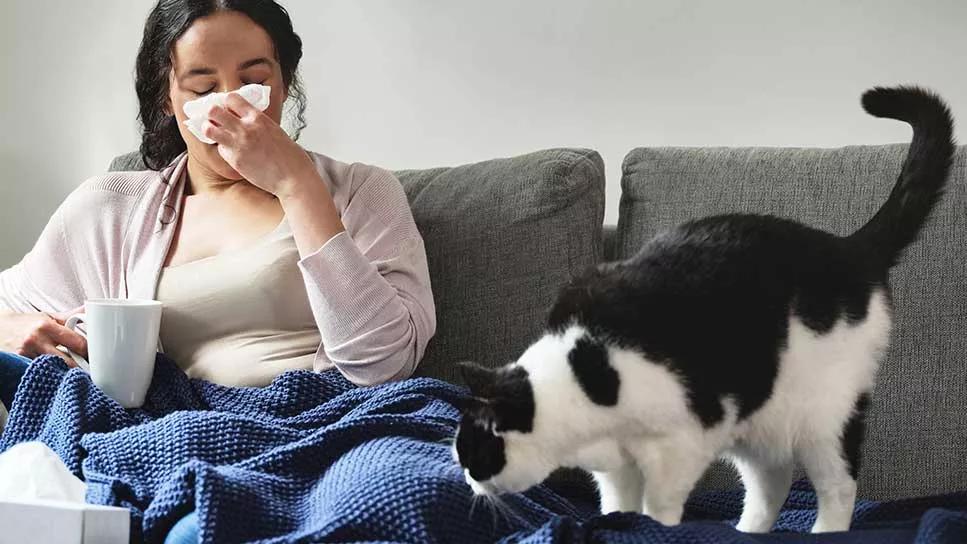Indoor allergens know no season!

Image content: This image is available to view online.
View image online (https://assets.clevelandclinic.org/transform/c8e52f67-315b-4f76-825d-8498635c5167/Winter-Allergies-1369112498-967x544-1_jpg)
female on couch, holding mug, under blanket, blowing nose, cat on couch
Just thinking about ragweed pollen may make your eyes itch and bring on a sneeze. (ACHOO!) Ditto for tree pollen, grass pollen and other allergy triggers that float around the great outdoors in spring, summer and fall.
Advertisement
Cleveland Clinic is a non-profit academic medical center. Advertising on our site helps support our mission. We do not endorse non-Cleveland Clinic products or services. Policy
So, when freezing winter temperatures halt pollen production and send you indoors, you should be able to breathe a non-stuffy sigh of relief, right?
Not necessarily. It turns out that being cooped up in a house can make allergy symptoms worse for some people. Let’s learn more about allergens lurking in your home from allergist Sandra Hong, MD.
What people call “winter allergies” doesn’t involve sneezing at the first sight of snow. It’s more a reference to allergy-driven sniffles and sneezes that come when you spend more time inside your home.
In truth, “winter allergies” are nothing more than perennial indoor allergies that you’re more exposed to during certain times of the year, says Dr. Hong.
If you live in a cold-weather climate, that’s winter. But those same allergy issues can make your life miserable if you live in an area where scorching summertime temperatures keep you inside for months.
Surveys show that most people spend about two and a half hours a week cleaning inside their homes. Despite all that elbow grease, it’s safe to say that folks miss a few spots when it comes to eliminating allergens.
Research shows that more than 99% of homes have at least one main allergen always present. Most homes (74.6%) have between three and six allergens present.
Advertisement
Dr. Hong says the most common culprits behind winter allergies include:
Classic symptoms of indoor allergies include:
Indoor allergies can send you regularly scrambling for a box of tissues. Ditto for the common cold. So, how do you tell the two apart, given the similarity in symptoms?
A cold typically lasts a few days to a week, with symptoms peaking in the middle of that period before slowly disappearing. Facial pain, headaches, fatigue and a fever can be part of the package.
Allergies, on the other hand, tend to linger longer without hitting the same extremes as a cold, clarifies Dr. Hong.
Eliminating ALL allergens from your home borders on the impossible, as the research noted shows. But there are things you can do to minimize indoor allergens and their annoying effects, says Dr. Hong.
Here are eight ways to help keep your winter allergies from flaring up:
Advertisement

Sign up for our Health Essentials emails for expert guidance on nutrition, fitness, sleep, skin care and more.
Learn more about our editorial process.
Advertisement
Most antihistamines, like Zyrtec, are OK, but avoid decongestants for at least the first trimester
You can now get lifesaving epinephrine in a nasal spray and prefilled syringes
Drowsiness is a side effect of inflammation, disrupted sleep and, sometimes, your allergy medicine
If you’re sensitive to aspirin or other salicylates, limiting exposure is the best remedy
Mold exposure can cause allergic reactions, asthma and skin rashes
If allergies have you coughing and sniffling all night, try showering before bed, keeping the windows closed and propping your head up
If allergies make your mornings a slog, consider closing the windows and showering at night
When the trees start to bloom, your allergies can come to life — medications, closing the windows and keeping clean can help
Prioritize your health by managing stress, strengthening your social connections and getting quality sleep
Bolsters, blankets, pillows and blocks can offer extra support, stability and comfort
Allergies, postnasal drip, asthma or reflux could be to blame for a cough that won’t quit